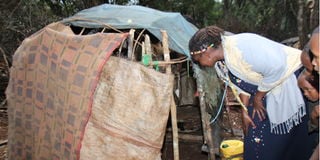Humanitarian crisis: Samburu families displaced by banditry struggle for survival

Makeshift structures sheltering banditry victims at Nkabaai area in Samburu North. Widespread endemic poverty and heavy rains have combined to complicate the insecurity of the people that are already vulnerable.
What you need to know:
- Makeshift structures sheltering banditry victims at Nkabaai area in Samburu North. Widespread endemic poverty and heavy rains have combined to complicate the insecurity of the people that are already vulnerable.
- Endemic poverty and heavy rains compound the insecurity for these vulnerable people, and road-daylight attacks have become routine despite intensified security operations by police backed by the military.
Agnes Leshikuya's face bears a dry smile, betraying the anguish she has undergone in the last three months.
Jostling for space in a makeshift shelter during the heavy afternoon rain, she finds room for some of her children while others brave the downpour.
"This is not our wish. We have been pushed to the walls by these criminals, bandits and cattle rustlers," Leshikuya says, her voice breaking.
She then wraps her one-year-old child in a Maasai shuka, grateful to be alive after an escape from Soit Pus village in Samburu County three months ago.
"Bullets ricocheted daily. Let me say they (bullets) were just raining. I was very lucky to escape alive together with my children," she recounts of the bandit attack that forced her out of her home, where she lost hundreds of livestock.
Approaching the Nkabaai area, the crowd appears like a marketplace, but closer inspection reveals internally displaced families totalling close to 300 constructing makeshift shelters.

Makeshift structures sheltering banditry victims at Nkabaai area in Samburu North.
The people were forced to flee from their villages and are now seeking safety at the Nkabaai Internally Displaced Persons (IDP) camp after bandits ransacked and burnt adjacent villages.
But even here, the likes of Leshikuya lament abandonment by the government.
“We eat but not every day and we are not even sure of where it will come from. But we eat," she says.
Endemic poverty and heavy rains compound the insecurity for these vulnerable people, and road-daylight attacks have become routine despite intensified security operations by police backed by the military.
Now, a humanitarian crisis looms as more people flee bandit hotspots, with hundreds of learners out of school after closures due to banditry. Four schools remain shut despite learners in other counties continuing with learning.
Locals told Nation.Africa the government should resettle them and provide them with relief food and other material interventions.
"We are law abiding citizens. We have already been displaced, and also others have just been told to vacate. Please, let the government resettle us," said James Lenaseyian.
Samburu County Commissioner John Cheruiyot insists on relative calm and government efforts to eliminate banditry.
The administrator said the government had already deployed enough security personnel, including the National Police Reservists (NPRs), to patrol and beef up security in the area.
"There are no alarming cases, and therefore there is no need to fear. We have our security officers patrolling the areas. I urge parents to take children to school without fear," Cheruiyot said.
Samburu Woman Representative Pauline Lenguris said that the insecurity in the region had reduced hardworking pastoralists to unimaginable poverty levels.
Lenguris said that the locals live in unsanitary conditions and urgently need food and non-food items.
"These are hardworking Kenyans confined here unwillingly. They have been pushed to unimaginable poverty levels because their animals were recently driven away by armed bandits," said Lenguris, adding that the activities of banditry have disrupted farming, pastoralism, the main occupation of the people in Samburu West parts of Samburu North.
President William Ruto recently ordered the deployment of military officers to rehabilitate classes destroyed by bandits, assuring parents of security for all learners and institutions in the troubled North Rift region.
The government is preparing an aggressive aerial operation to combat armed bandits in Kenya's North Rift region counties of Samburu, Baringo, Elgeyo Marakwet, Turkana, West Pokot and Laikipia.
For the first time, police will utilize sophisticated gunship helicopters to enhance their capacity against banditry and complex crimes.
Three weeks ago, Interior Cabinet Secretary Kithure Kindiki announced that these helicopters, equipped with advanced surveillance and firepower, aim to give security forces an edge over bandits who exploit the rough terrains for attacks and evasion.
"The decision to acquire gunship helicopters stems from the need to bolster security forces' capabilities in dealing with highly organised and heavily armed bandit groups," said CS Kindiki. The helicopters are expected to be particularly effective in Malaso in Samburu and Mkogodo Forest in Baringo.
He spoke at the Mombasa Port after flagging off the second batch of 10 Armoured Personnel Carriers for the police service.





